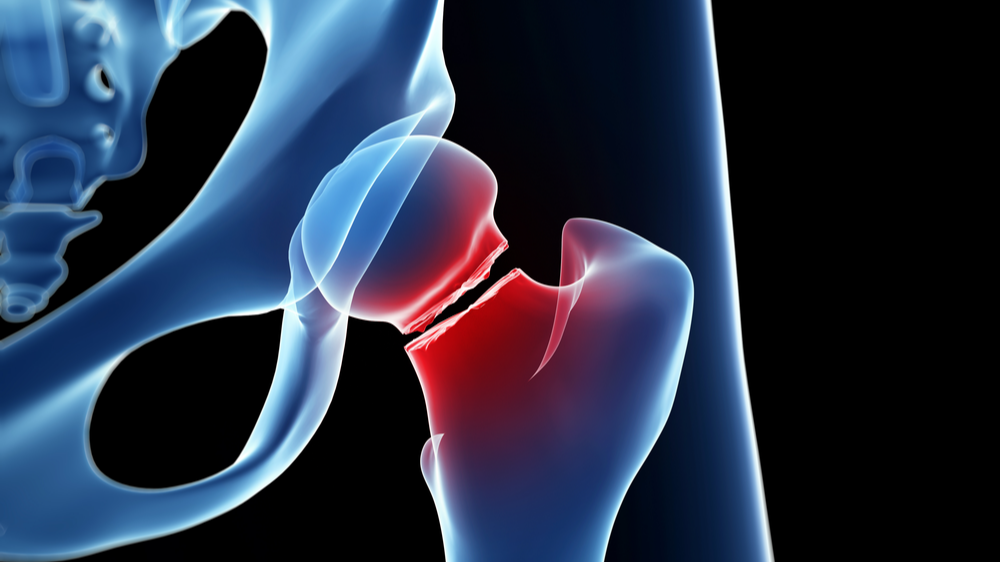Study: Vegetarians Have Higher Risk of Hip Fracture
- Adding fish to the diet seems to mitigate the effects.

Studying a large British cohort, scientists have found that vegetarians have an increased risk of hip fracture compared to regular meat eaters, but pescatarians and occasional meat eaters do not [1].
Diet and brittle bones
Hip fracture is one of the injuries most associated with aging. While hip fracture itself is treatable, it can easily set people on a slippery slope to frailty. Even after a successful surgery, patients often suffer from limited mobility and increased fear of movement, which leads to an overall decline in quality of life and an increased risk of chronic illness and death. Hip fractures are also a heavy burden on the healthcare system, costing 6 billion dollars annually in the US alone [2].
Dietary choices influence almost every aspect of health. Vegetarian and vegan diets, while having numerous health benefits, have long been suspected to increase risk of fractures [3] due to lower intakes of certain nutrients such as protein, vitamin D, and vitamin B12. Some studies have linked these diets to lower muscle mass and bone density, both of which are risk factors for fractures [4]. However, studies of hip fracture with sufficient numbers of vegetarians and vegans in the sample are scarce.
Higher risk for vegetarians
This new study, like many others, uses data from UK Biobank, a repository of health information on about half a million British citizens. Due to its enormous size, Biobank has made a lot of quality research possible. The analysis was adjusted for many confounding variables, including sex, ethnicity, socioeconomic status, tobacco and alcohol consumption, physical activity, body mass index, and history of disease.
The study used regular meat eaters as a baseline. Occasional meat eaters had virtually the same prevalence of hip fractures (a hazard ratio of 0.99: 1% lower than in regular meat eaters). Pescatarians had statistically insignificantly elevated risk (a hazard ratio of 1.08). Vegetarians fared the worst, with a massive 50% increase in hip fracture incidence.
Further analysis revealed BMI to be a significant part of the relationship between diet and hip fracture, as it statistically explained 28% of the effect. Lean mass and vitamin D levels in blood could not account for the difference between vegetarians and regular meat-eaters.

Initially, the vegetarian category included vegans. When vegans were considered separately, the risk estimate for vegetarians was attenuated (hazard ratio of 1.38), while vegans emerged as the riskiest category by far, with a hazard ratio of 3.26. However, due to the small number of vegans in the sample (400 participants and only 10 cases of hip fracture), these results should be taken with a grain of salt.
Consider and mitigate the risks
The results of this study are mostly in line with the scarce existing research on the subject, and they serve as a reminder that vegetarians and especially vegans that their diets must contain sufficient nutrients that are more plentiful in other diets. However, as the researchers note, “whilst the relative increase in hip fracture risk for vegetarians was high (50%), this represents an absolute difference of only 3.2 more cases per 1000 people over 10 years. This modest absolute risk difference should be weighed against the potential associated health benefits of vegetarian diets for more common conditions, including 13 fewer cancers per 1000 people over 10 years and a 9% lower risk of CVD observed previously in the UK Biobank.”
An additional strength of this study was that it considered pescatarians: people who eat fish but not other animals. Several studies have suggested that this diet, when combined with other healthy practices, reaps most of the benefits of animal-based foods while avoiding most of the risks, although this too is still being investigated.
Vegetarian men and women had a higher risk of hip fracture than regular meat-eaters and were in part explained by their lower BMI, but absolute risk differences were small and should be weighed against the potential health benefits of vegetarian diets. Further work is needed to fully understand mechanisms underpinning risk differences; diet planning and weight management could help to mitigate the risk difference, and warrant exploration in further studies so that policy recommendations can advance.
Literature
[1] Webster, J., Greenwood, D. C., & Cade, J. E. (2023). Risk of Hip Fracture in Meat Eaters, Pescatarians, and Vegetarians: A Prospective Cohort Study of 413,914 UK Biobank Participants. Pescatarians, and Vegetarians: A Prospective Cohort Study of, 413.
[2] Manetti, S., Turchetti, G., & Fusco, F. (2020). Determining the cost-effectiveness requirements of an exoskeleton preventing second hip fractures using value of information. BMC health services research, 20, 1-11.
[3] Tong, T. Y., Appleby, P. N., Armstrong, M. E., Fensom, G. K., Knuppel, A., Papier, K., … & Key, T. J. (2020). Vegetarian and vegan diets and risks of total and site-specific fractures: results from the prospective EPIC-Oxford study. BMC medicine, 18(1), 1-15.
[4] Iguacel, I., Miguel-Berges, M. L., Gómez-Bruton, A., Moreno, L. A., & Julián, C. (2019). Veganism, vegetarianism, bone mineral density, and fracture risk: a systematic review and meta-analysis. Nutrition reviews, 77(1), 1-18.
- Diet, News
- Bone, Diet, Osteoporosis







